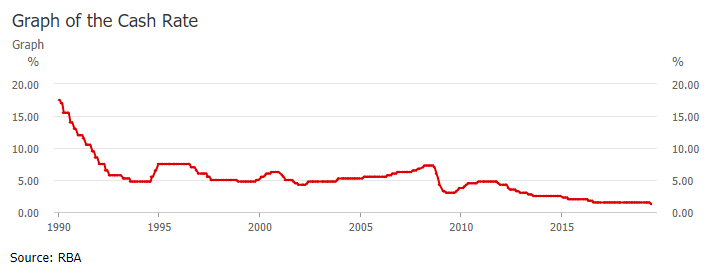For the first time in almost three years, the Reserve Bank of Australia (RBA) has cut Australia’s interest rate by 0.25% to 1.25%.
The Reserve Bank of Australia is Australia’s central bank. One of its biggest roles is to decide Australia’s interest rate, taking into account economic conditions including unemployment, inflation and the housing market. The RBA interest rate has a ripple effect across the whole economy.
RBA Cuts Interest Rates By 0.25%
As predicted by most economists, the RBA Board decided to reduce the official interest rate by 0.25% to 1.25%.
Why Did The RBA Cut Interest Rates?
The RBA Board took the decision to “support employment growth and provide greater confidence that inflation will be consistent with the medium-term target“.
However, Australia is also exposed to the trade war between its largest trade partner (China) and one of its closest political allies (USA). The RBA is concerned about what effect a trade war might have on Australia’s economy, with growth in international trade remaining weak.
The RBA wouldn’t be cutting interest rates if it thought everything was rosy. employment growth has been strong over the past year but unemployment has recently been ticking upwards.
Australia’s central bank also made reference to weak Australian household consumption, partly affected by falling Australian house prices.
Inflation is also very low at the moment, with pressure across the economy. The RBA expects underlying inflation will be 1.75% this year and 2% in 2020.
Ultimately, the RBA Board hopes that today’s decision will “help make further inroads into the spare capacity in the economy and hopefully assist with faster progress in reducing unemployment and achieve more assured progress towards the inflation target.”
What Does This Mean?
There are a raft of changes that may happen. It’s quite likely that bank savings accounts will earn even less money. The Australian dollar is likely to fall over time, particularly if more cuts occur.
If the RBA does enact another two RBA cuts over the next year then we could see a shift in policy somewhat similar to the GFC when the interest rate was quickly cut.

Politically, the big banks like Westpac Banking Corp (ASX: WBC) and Commonwealth Bank of Australia (ASX: CBA) will be under pressure to pass on the entire cut to borrowers.
However, theoretically asset prices are likely to go up, particularly with growth shares like REA Group Limited (ASX: REA), because all assets are valued against interest rates.
I’m not going to change my investment strategy due to one (or a few) RBA interest rate cuts, but I think it’s important to be aware what the RBA is doing.
That’s why I’m interested in the ASX shares in the free report below – they can keep growing no matter what the RBA does.
[ls_content_block id=”14945″ para=”paragraphs”]
[ls_content_block id=”18380″ para=”paragraphs”]









